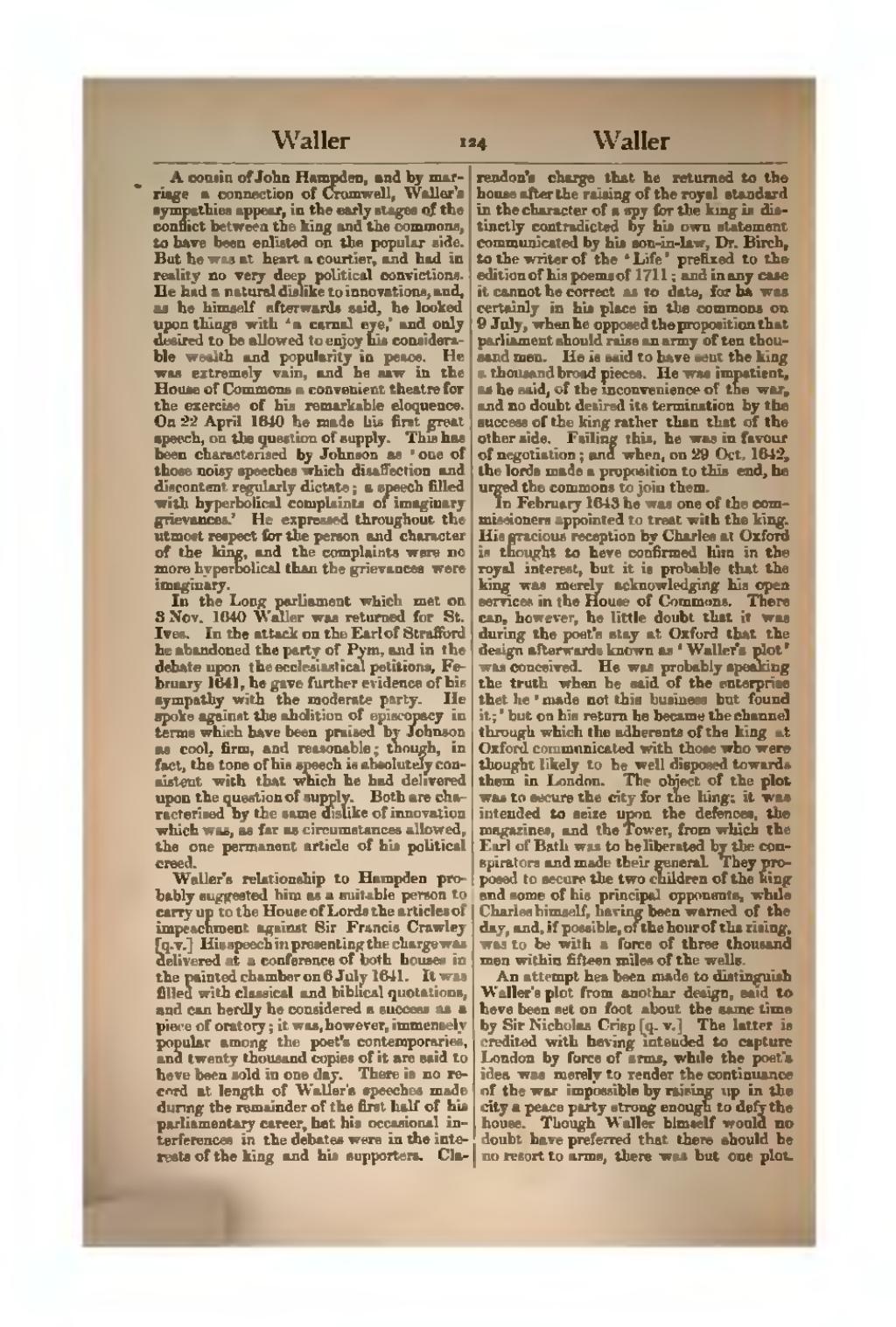A cousin of John Hampden, and by marriage a connection of Cromwell, Waller's sympathies appear, in the early stages of the conflict between the king and the commons, to have been enlisted on the popular side. But he was at heart a courtier, and had in reality no very deep political convictions. He had a natural dislike to innovations, and, as he himself afterwards said, he looked upon things with ‘a carnal eye,’ and only desired to be allowed to enjoy his considerable wealth and popularity in peace. He was extremely vain, and he saw in the House of Commons a convenient theatre for the exercise of his remarkable eloquence. On 22 April 1640 he made his first great speech, on the question of supply. This has been characterised by Johnson as ‘one of those noisy speeches which disaffection and discontent regularly dictate; a speech filled with hyperbolical complaints of imaginary grievances.’ He expressed throughout the utmost respect for the person and character of the king, and the complaints were no more hyperbolical than the grievances were imaginary.
In the Long parliament which met on 3 Nov. 1640 Waller was returned for St. Ives. In the attack on the Earl of Strafford he abandoned the party of Pym, and in the debate upon the ecclesiastical petitions, February 1641, he gave further evidence of his sympathy with the moderate party. He spoke against the abolition of episcopacy in terms which have been praised by Johnson as cool, firm, and reasonable; though, in fact, the tone of his speech is absolutely consistent with that which he had delivered upon the question of supply. Both are characterised by the same dislike of innovation which was, as far as circumstances allowed, the one permanent article of his political creed.
Waller's relationship to Hampden probably suggested him as a suitable person to carry up to the House of Lords the articles of impeachment against Sir Francis Crawley [q. v.] His speech in presenting the charge was delivered at a conference of both houses in the painted chamber on 6 July 1641. It was filled with classical and biblical quotations, and can hardly be considered a success as a piece of oratory; it was, however, immensely popular among the poet's contemporaries, and twenty thousand copies of it are said to have been sold in one day. There is no record at length of Waller's speeches made during the remainder of the first half of his parliamentary career, but his occasional interferences in the debates were in the interests of the king and his supporters. Clarendon's charge that he returned to the house after the raising of the royal standard in the character of a spy for the king is distinctly contradicted by his own statement communicated by his son-in-law, Dr. Birch, to the writer of the ‘Life’ prefixed to the edition of his poems of 1711; and in any case it cannot be correct as to date, for he was certainly in his place in the commons on 9 July, when he opposed the proposition that parliament should raise an army of ten thousand men. He is said to have sent the king a thousand broad pieces. He was impatient, as he said, of the inconvenience of the war, and no doubt desired its termination by the success of the king rather than that of the other side. Failing this, he was in favour of negotiation; and when, on 29 Oct. 1642, the lords made a proposition to this end, he urged the commons to join them.
In February 1643 he was one of the commissioners appointed to treat with the king. His gracious reception by Charles at Oxford is thought to have confirmed him in the royal interest, but it is probable that the king was merely acknowledging his open services in the House of Commons. There can, however, be little doubt that it was during the poet's stay at Oxford that the design afterwards known as ‘Waller's plot’ was conceived. He was probably speaking the truth when he said of the enterprise that he ‘made not this business but found it;’ but on his return he became the channel through which the adherents of the king at Oxford communicated with those who were thought likely to be well disposed towards them in London. The object of the plot was to secure the city for the king; it was intended to seize upon the defences, the magazines, and the Tower, from which the Earl of Bath was to be liberated by the conspirators and made their general. They proposed to secure the two children of the king and some of his principal opponents, while Charles himself, having been warned of the day, and, if possible, of the hour of the rising, was to be with a force of three thousand men within fifteen miles of the walls.
An attempt has been made to distinguish Waller's plot from another design, said to have been set on foot about the same time by Sir Nicholas Crisp [q. v.] The latter is credited with having intended to capture London by force of arms, while the poet's idea was merely to render the continuance of the war impossible by raising up in the city a peace party strong enough to defy the house. Though Waller himself would no doubt have preferred that there should be no resort to arms, there was but one plot.
